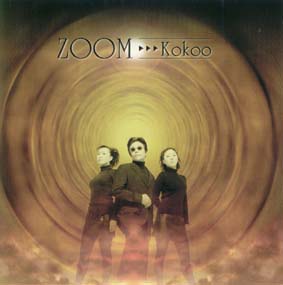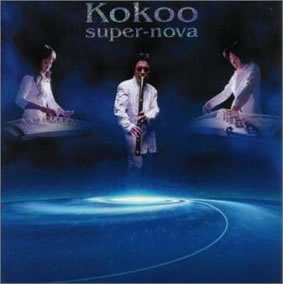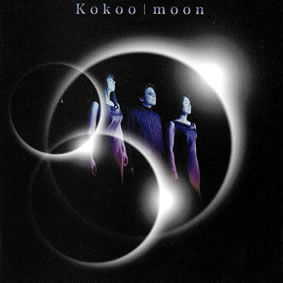ZOOM
■ZOOM [Akikazu Nakamura] 6:04
shakuhachi=Akikazu Nakamura,20-string koto=Michiyo Yagi,17-string koto=Miki Maruta
This song features a pan-diatonic melody and many “noisy” elements. The timing irregular time appears in episode, shifting in each bar as follows: 7/16, 9/16, 7/16, 10/16, 7/16, 12/16, 7/16, 16/16. The shakuhachi is played with circular breathing and koto’s improvisation is formed with quintuplet. Percussive effects are include beating the strings of a 17-string bass koto with a pair of drum sticks.
SAMPLE 720k
■WINTER SONG [Toshifumi Hinata] 4:34
shakuhachi=Akikazu Nakamura,koto=Miki Maruta,17-string koto=Michiyo Yagi
Composer Toshifumi Hinata wrote this song as an original composition for this album. The song is a smooth flow of sound that evokes the emotional landscape of winter. Hinata produced the song, recording it with Kokoo at his own studio.
SAMPLE 720k
■DORIAN IN THE BLUE SEA [Akikazu Nakamura] 8:05
shakuhachi=Akikazu Nakamura,koto=Miki Maruta,17-string koto=Michiyo Yagi
In composing this, Nakamura was inspired by a northern Japanese folk song “Honjo Oiwake”. Based on the original 5 + 5/16 time of “Honjo oiwake”, his composition develops extends to 5 + 5 + 5 + 5/32 time. The dorian scale for this piece appears often in British folk music. There are four parallel and distinct voices; shakuhachi, right hand and left hand of 13-string koto, 17-string bass koto, that trickly keep their sensitive distance and progress, using Japanese-style counterpoint throughout the song, right into the closing cut-out.
SAMPLE 720k
■MOONCHILD [Robert Fripp, Michael Giles, Greg Lake, Ian McDonald, Pete Sinfield/arr. Akikazu Nakamura] 5:15
shakuhachi=Akikazu Nakamura,20-string koto=Michiyo Yagi,17-string koto=Miki Maruta
Here Nakamura re-arranges one of King Krimson’s most popular tunes. Kokoo mak es use of higher tensions, upper structure triads and hybrid chords. For the shakuhachi’s melody, more overtones and multiple tones are used to give the song a more colourful imagery.
SAMPLE 720k
■PAPER PLANE IN A UNIVERSE OF CONSTANT LIGHT SPEED [Jyoji Sawada] 5:16
shakuhachi=Akikazu Nakamura,koto=Miki Maruta,17-string koto=Michiyo Yagi
An original composition for Kokoo. My image expressed in this piece is a paper plane that changes its shapes and forms constantly kaleidoscope-wise in a whirl of light speed. There appear a part of ambience and a part of groove alternately, as if the performers (= the universe) are ticking devotedly their own time in the universal time, accepting and rejecting their uncertainty of their time-ticking in a eternal progress of time. (notes by Jyoji Sawada)
SAMPLE 660k
■FAIRY TALE [Akikazu Nakamura] 4:44
shakuhachi=Akikazu Nakamura,koto=Michiyo Yagi,17-string koto=Miki Maruta
This song was first recorded in the album “Neutral Point” in 1991, by Akikazu Nakamura’s another unit “FOREST”, which released by Victor Entertainment in Ja pan and distributed by MCA in USA. The composer himself had re-written it for Kokoo. There are different and fresh trying of “pronouncing”: hand-clapping, stomping, slapping koto’s body, Bartok pizzicato, making a hormony by blowing shakuhachi and vocalizing parallel, etc.
SAMPLE 720k
■BREATH FOR THE MOON [Haruno Kira] 12:28
The moon has been always holy and mysterious for us human race from the ancien t time. As a good contrast to the bright and lightening sun, we feel some tension in our mind and try to regulate our breath when the moon appears. I know that there are so many “unaccountable” pieces in contemporary music. Like the moon holds a kind of unaccount strangeness in its beauty, I also wanted to express both “beauty” and “unacountability” equally. Originally this piece was composed for shakuhachi, biwa (or Japanese lute), 17-string koto and two percussions for the comission by Nakamura and then re-written the arrangement for Kokoo in 1995. (notes by Haruno Kira)
SAMPLE 720k


